|
|
|
Sort Order |
|
|
|
Items / Page
|
|
|
|
|
|
|
| Srl | Item |
| 1 |
ID:
171785
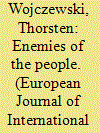

|
|
|
|
|
| Summary/Abstract |
Populists are on the rise across the globe and claim to speak on behalf of ‘the people’ that are set against the establishment in the name of popular sovereignty. This article examines how populist discourses represent ‘the people’ as a referent object that is threatened and the form and implications of this populist securitisation process. Drawing on securitisation theory and poststructuralism, the article understands populist securitisation as a discursive practice that propagates a politics of fear, urgency, and exceptionality in order to mobilise ‘the people’ against a ‘dangerous’ elite and normalise this antagonistic divide of the social space. While the proposed theoretical framework aims to clarify the relationship between poststructuralist and securitisation theory and capture the nexus between populism and security, the case of populism broadens the scope of potential subjects of security and poses important challenges to existing theoretical assumptions about security as something designated by states’ representatives and ‘security experts’. The article develops and illustrates its arguments with a case study on the (de)securitisation moves in the populist discourse of Donald Trump.
|
|
|
|
|
|
|
|
|
|
|
|
|
|
|
|
| 2 |
ID:
195380


|
|
|
|
|
| Summary/Abstract |
Nominally, the policy of the United States towards the People’s Republic of China (PRC) and Taiwan is governed by the ‘One China’ Policy (OCP). However, the conditions under which OCP was originally formulated have long since given way to substantial growth in the economic and military power of the PRC and the democratisation of Taiwan. These changes raise several questions regarding the viability and applicability of OCP. Drawing on securitisation theory, this article examines discourses across three US presidential administrations to assess the trajectory of socio-political constructions of the PRC, Taiwan, and OCP. Three case studies suggest substantial challenges for OCP as a basis for maintaining desecuritised relations between the United States and the PRC. While discourses of ‘engagement’ prominent in the 1990s have lost ground, with presidential administrations increasingly but inconsistently drawing on OCP, in Congress OCP plays no role, while Taiwan is increasingly constructed as akin to the American self, serving as an identity proxy that highlights the otherness of the PRC. Polling supports the idea that OCP is not rooted in general American understandings of the region and consequently cannot serve to ground policy in a crisis.
|
|
|
|
|
|
|
|
|
|
|
|
|
|
|
|
| 3 |
ID:
141065
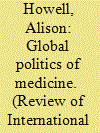

|
|
|
|
|
| Summary/Abstract |
This article makes the case for a new field in International Relations (IR): the Global Politics of Medicine. It argues that significant avenues of research can be opened up by focusing on medicine and the life sciences, in order to both challenge current IR theories, and develop new theoretical and empirical insights in IR. In particular, the article challenges the validity of securitisation theory, and specifically the argument that health has been securitised. Showing instead that medicine and warfare have been imbricated from the nineteenth century as strategies of population, it challenges securitisation theory's ahistoricism and its assumption that social security and international security (and the norm/exception) are analytically divisible. Bringing this into the present through the examples of triage, psychological resilience, and genetic intelligence in counterinsurgency, it traces how warfare and medicine now ambitiously seek to treat populations as sets of individual bodies. Arguing that we cannot retreat to some mythical state of politics ‘prior’ to securitisation, it draws out how the fields of war, health, and medicine are nonetheless highly contested. The article concludes by challenging the fields of Global Health, war, and security studies, but also suggests novel routes for pursuing the study of the Global Politics of Medicine.
|
|
|
|
|
|
|
|
|
|
|
|
|
|
|
|
| 4 |
ID:
183900
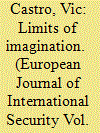

|
|
|
|
|
| Summary/Abstract |
Securitisation theory has too often been associated with the liberal state of exception and its problematic baggage. The Copenhagen School's early claims to deconstruct (not reproduce) the national security logic seem overlooked. Using the fantasy video game World of Warcraft as a large-scale thought experiment, this article asks how a distinct security mode is still possible when the normalisation of armed violence exceeds even what Carl Schmitt's political theory can provide for. Following a careful reading of Ole Wæver's formulation of the ‘existential threat’, securitisation asserts that without a certain referent object, the world becomes meaningless. As a tool for reshaping the limits of imagination, securitisation enacts political communities in World of Warcraft by turning upside down common wisdom about normalcy and security. While normal politics are violently conflictual, securitisation fills in the role of international norms and organisation, fostering supranational cooperation and erasing sovereign disputes. Securitisation thus far exceeds its contingent incarnation in the modern concept of security – a conclusion that has consequences for the normative debate on securitisation and for non-Western interpretations of the theory.
|
|
|
|
|
|
|
|
|
|
|
|
|
|
|
|
| 5 |
ID:
088088
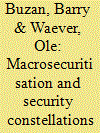

|
|
|
|
|
| Publication |
2009.
|
| Summary/Abstract |
The Copenhagen school's theory of securitisation has mainly focused on the middle level of world politics in which collective political units, often but not always states, construct relationships of amity or enmity with each other. Its argument has been that this middle level would be the most active both because of the facility with which collective political units can construct each other as threats, and the difficulty of finding audiences for the kinds of securitisations and referent objects that are available at the individual and system levels. This article focuses on the gap between the middle and system levels, and asks whether there is not more of substance there than the existing Copenhagen school analyses suggests. It revisits the under-discussed concept of security constellations in Copenhagen school theory, and adds to it the idea of macrosecuritisations as ways of getting an analytical grip on what happens above the middle level. It then suggests how applying these concepts adds not just a missing sense of scale, but also a useful insight into underlying political logics, to how one understands the patterns of securitisation historical, and contemporary.
|
|
|
|
|
|
|
|
|
|
|
|
|
|
|
|
| 6 |
ID:
088091
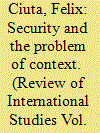

|
|
|
|
|
| Publication |
2009.
|
| Summary/Abstract |
How do we know when we are dealing with security issue? This is a cardinal question in Security Studies, and securitisation theory provides and authoritative yet incomplete answer, mainly because it rules out that the meaning of security can vary contextually. To overcome this limitation, we need a hermeneutical perspective centred on the liminality of security as a category in-between theory and policy, which produces a more precise algorithm for empirical research. A contextual hermeneutics of security signals that normative awareness is necessary even in the absence of a unifying normative manifesto, also confronts the spectre of the "death of security" invoked by those who object to the potentially endless broadening of its meaning.
|
|
|
|
|
|
|
|
|
|
|
|
|
|
|
|
| 7 |
ID:
165868


|
|
|
|
|
| Summary/Abstract |
Despite the fact that the Korean nuclear crisis is one of the most protracted security issues in the world, the research analysing the crisis from the perspective of securitisation theory is curiously absent. This article attempts to pin down some distinguishing features of South Korea’s securitisation of the nuclear threat posed by North Korea, thereby investigating why one rarely sees the implications of securitisation theory in the way that the Copenhagen School theorists would suggest. Borrowing the key components of securitisation theory—existential threats, referent objects and extraordinary measures—this article suggests three elusive characteristics of the South Korean actors’ speech acts as sources highlighting the dilemma. To make the article’s arguments clearer, I hold Floyd’s classification of securitisation theory, which separated the securitisation process into two different stages: securitising move and security practice. While acknowledging the importance of the differences between illocution and perlocution in a securitisation process, this article takes this logic one step further by suggesting the limits of the perlocutionary effect in making the securitisation process complete.
|
|
|
|
|
|
|
|
|
|
|
|
|
|
|
|
|
|
|
|
|